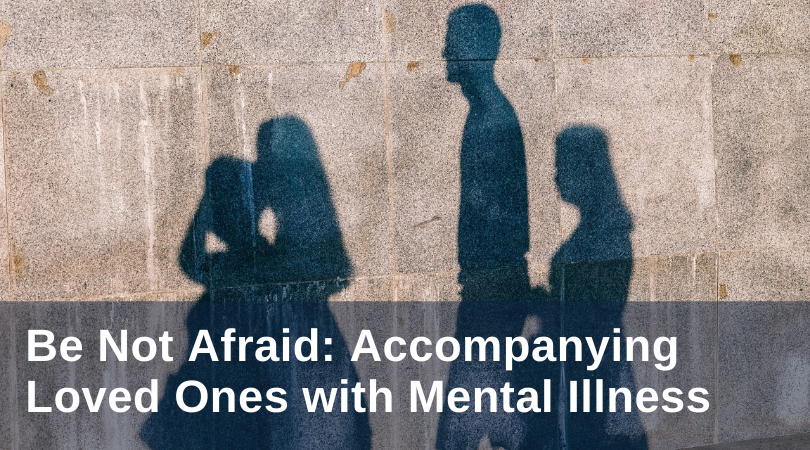
I never used to be a wailer or fist banger. I didn’t understand what would drive people to do such things. That was before. Before my child’s brain broke. As my son slipped deeper into schizophrenia, I lost parts of myself, too. I lost my balance as I tried to navigate this bewildering maze of new behaviors and medical resources until I felt consumed by a rage and then a wailing cry to God to help me.
Today we refer to broken brains as having a mental illness. Unlike physical illnesses, mental illnesses often cause us to lose the very core of our identity. Without knowing why, we think differently than most other people, or from the way we used to think. We respond to family and friends in new ways and often misinterpret their words or actions. We don’t understand how this is happening or why we are acting differently. We hide our fear and confusion. And we somehow know that, to acknowledge that anything is amiss, invites a lot of “b.s.”: blame and shame. It takes tremendous courage to reach out for help when we are in pain. The “b.s. factor” related to mental illness heightens our fears. As a parent of a child with mental illness, I am afraid. Afraid for my child. Afraid I can’t help enough. Afraid he will never regain health. Afraid something I did caused the illness.
In my despair, I turned to God. Mine was a timid turn at first. I prayed more and read more Scripture. Things got more serious when my wailing and fist banging began. My prayers went from polite to real. Very slowly, over many years, God has responded to my fear and anger with gentle assurances and amazing grace, and too many angels to count. Each day my trust in him grows. And yet, it also waivers daily. If I were a tattooing kind of woman, I would inscribe “God told me to be not afraid, and that’s what I’m doing” on my hands.
I am nervous to offer advice to others who love someone who has a mental illness. Every person, every relationship, every illness is unique. The best advice is specific and personal. In reality, the ideas below hold true for every relationship we cherish, whether the person has a mental illness or not. Keeping this in mind, I share with you some of the lessons God has taught me about loving someone who sometimes appears unlovable.
1. Pray continually. Open your heart up completely to God.
You may already have a favorite psalm or prayer or song that brings you close to the Lord. A new prayer might be revealed to you. I have often prayed the Jesus Prayer as a way to be in contact with God as constantly as possible. God hears your cries. Pray continually.
2. Love. Let your loved one know of your steadfast love for them in as many ways as possible.
Small interactions mean a lot. A smile, a hand squeeze, a phone call, a favorite food. Understand that anger is usually the outward expression of your loved one’s interior pain and fear. Do not let the anger frighten you. Instead, show them the beauty you see in them. Love.
3. Listen. Become the best listener you can be.
Most of us think we are good listeners. Few of us are. Our egos tend to get in the way. Put yourself in their shoes. Read books; ask for feedback from friends. Commit yourself to listening to their feelings and needs. Start now. Listen.
4. Seek advice and support.
Talk to doctors, therapists, support groups, and others who have travelled this road. They will offer very helpful advice, but be mindful it is third party advice. Nobody knows or loves your loved one as much as you do. Nobody will stick by them and do whatever it takes to help them heal the way you will. No one. Still, you can’t do that alone. Seek advice and support.
5. Hope and trust in the Lord.
The minute you give up hope, your loved one will know it, even if you don’t. You will be tempted, often, to fall into despair. Instead, I urge you to place all of your hope and trust in God. He asks you do to this; he wants you to do this—to let him take care of you and your loved one. He will give you the grace and strength to endure your suffering and theirs. Hope and trust in the Lord.
6. Love yourself.
Make time to do things that are life-giving. Maintain personal boundaries, while still letting your loved one know that you will never abandon them. You will not be able to help your loved one, if you are void of hope and energy. Love yourself.
7. Be not afraid.
Of course you are afraid. But not as afraid as your loved one is. None of us can imagine the fear they are experiencing. God has promised to accompany us. Ask for and accept his companionship. Ask him with your words. With your heart. With your soul. God answers prayers. Be not afraid.
Like what you read? Submit your email below to have our newest blogs delivered directly to your inbox each week.
Featured image by Igor Ovsyannykov via Pixabay


